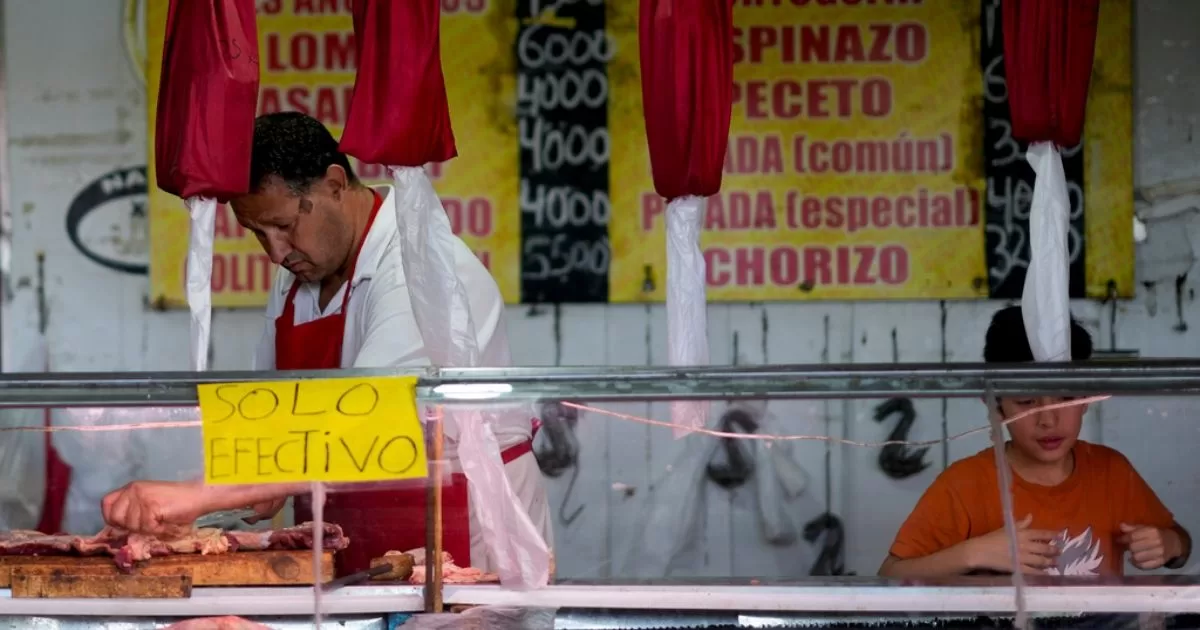BUENOS AIRES.- The inflation in Argentina registered the fourth consecutive month of deceleration in April, reaching 8.8% monthly, the first single-digit rate in a semester, a figure celebrated as “a rout” by the president Javier Mileialthough economists warn that it responds to the fall in consumption.
The variation in the consumer price index (CPI) has accumulated an increase of 65% so far this year, after the inflationary eruption of 25.5% in December, and stood at 289.4% year-on-year, reported this week by the National Institute of Statistics (Indec).
The sector with the greatest increase in the month was housing, water, electricity, gas and other fuels (35.6%). They were followed by communication (14.2%), due to increases in telephone and internet services, and clothing and footwear (9.6%), due to the change of season.
The two divisions that recorded the smallest increases were food and beverages (6%), goods and services (5.7%) and alcoholic beverages and tobacco (5.5%).
“We are beating inflation,” Milei celebrated, shortly before the first monthly single-digit record was announced since October of last year, when inflation stood at 8.3%.
The April figure was below the 11% in March, 13.2% in February and 20.6% in January, making the Milei government confirmed the trend towards price deceleration that it promised to undergo during 2024. Milei promotes an ambitious deregulation of the economy in order to reach “zero deficit” by the end of this year.
Argentina is experiencing a strong economic recession and a fiscal adjustment that allowed it to register a surplus in the first quarter of the year, which has not happened since 2008.
He International Monetary Fund (IMF) congratulated the Milei government for exceeding its goals and announced an agreement for the disbursement of almost 800 million dollars.
The multilateral organization highlighted the “first quarterly fiscal surplus in 16 years, the rapid fall in inflation, the change in trend of international reserves and a strong reduction in sovereign risk.”
Shortly after assuming the presidency, Milei launched a plan to sharply cut spending that included thousands of layoffs in the public administration and the suspension of infrastructure works. He in turn reduced subsidies to public transport and the energy sector, resulting in increases in train and bus tickets and electricity, gas and water rates.
For its part, the Ministry of Economy attributed the progressive slowdown in prices to the orthodox economic stabilization program, whose pillars are fiscal balance, the cleaning up of the Central Bank’s balance sheet and the implementation of deregulation and cost reduction measures for the sector. private.
He added that, in less than five months, the country managed to transition from an economy “with unanchored expectations and high risk of hyperinflation to one that has generated the conditions for the reappearance of long-term mortgage credit.”
Fall in consumption
The price reduction that merchants implemented in certain sectors takes place at a time when Argentines consume the bare minimum.
In April, retail sales of small and medium-sized businesses fell 7.3% while accumulating a drop of 18.4% in the first four months of the year. Compared to March, they rose 1.6%, according to the Argentine Confederation of Medium Enterprises.
Signs of slowdown abound. Between January and March, the consumption of beef – once a sacred food in Argentina – was 17.6% lower than in the same quarter of 2023 due to the increase in its value.
Economist Camilo Tiscornia attributed the collapse of the population’s purchasing power to the fact that Argentina has not grown for more than a decade.
“Their GDP (Gross Domestic Product) is more or less the same as 11 years ago. Under these conditions it is very difficult for people’s purchasing power to improve sustainably and I would tell you that in the last five or six years it has been falling,” explained Tiscornia, from the firm CT Asesores Economicos.
The analyst noted that the price controls and subsidy policies implemented by the previous government of Alberto Fernandez (2019-2023) to preserve a certain level of purchasing by the population were unsustainable “distortions” and the Milei government decided to open prices in search of greater economic efficiency.
“But your purchasing power, even though inflation is falling, is severely damaged. Because they are telling you things that had been swept under the rug for several years and you also have the effects of the economic recession… people are very hard hit,” said the economist.
The purchasing power of the average salary fell 20% in February compared to the same month in 2023, which is the latest data available, Tiscornia indicated. Meanwhile, the drop in the first three months of Milei’s government was 16%.
According to analysts, Argentines will be able to improve their purchasing power when the economy reactivates.
Along with Haiti, the Argentine economy was one of the hardest hit in the region in 2023, with a 2.5% contraction of its GDP. Around 41% of the more than 46 million inhabitants of the South American country are in poverty and international organizations predict that the economy will fall more than 3% this year.
Source: With information from AFP / AP


